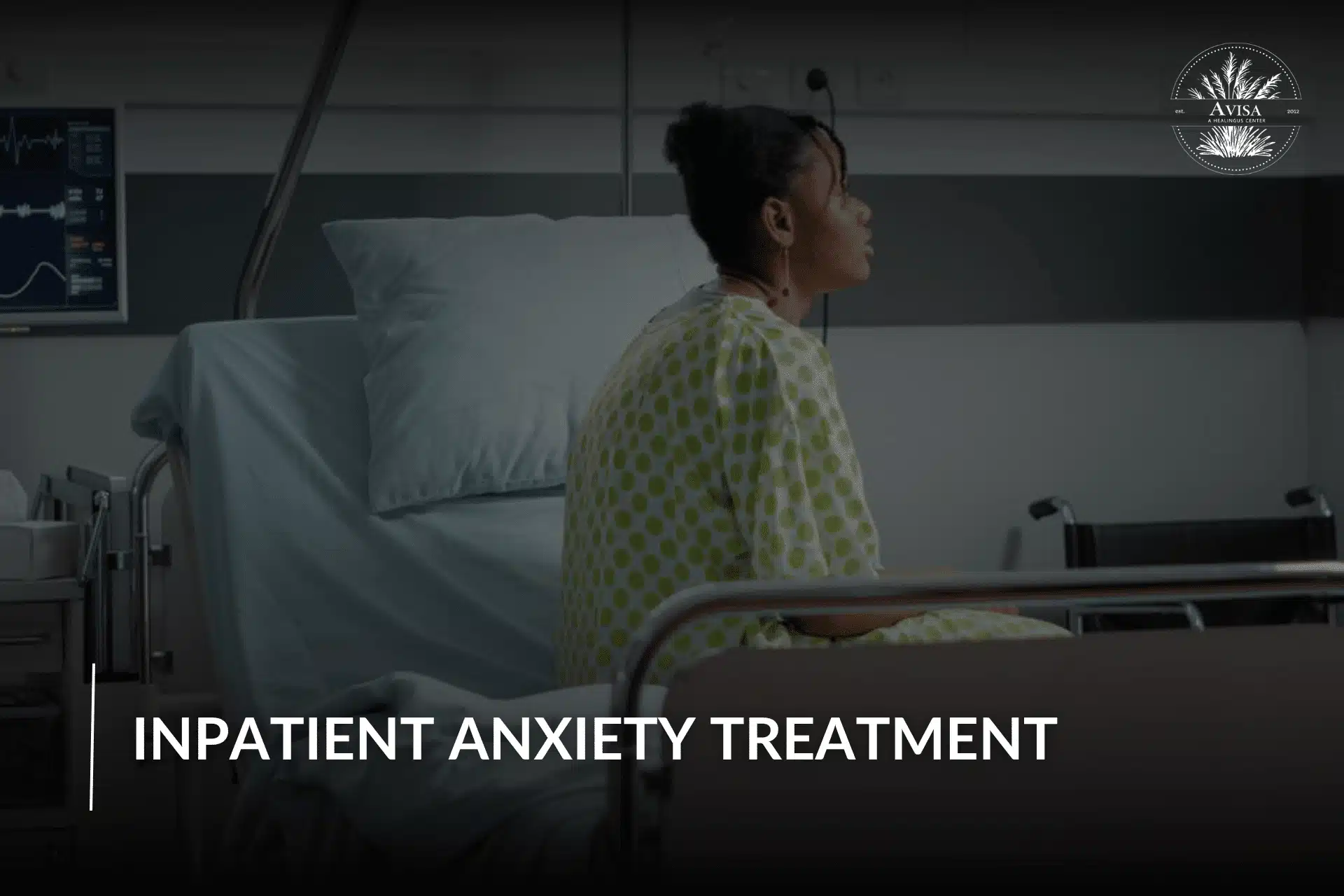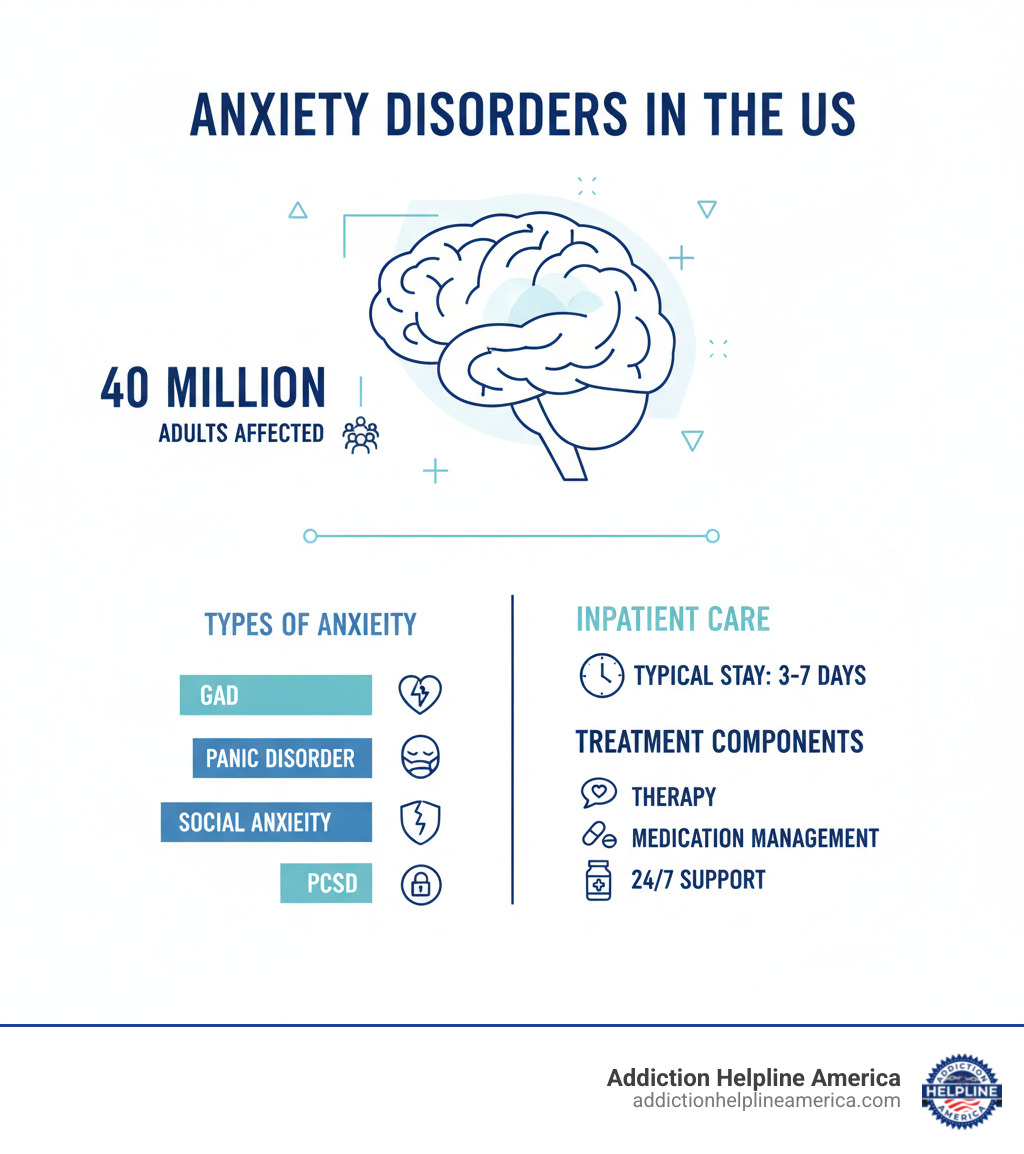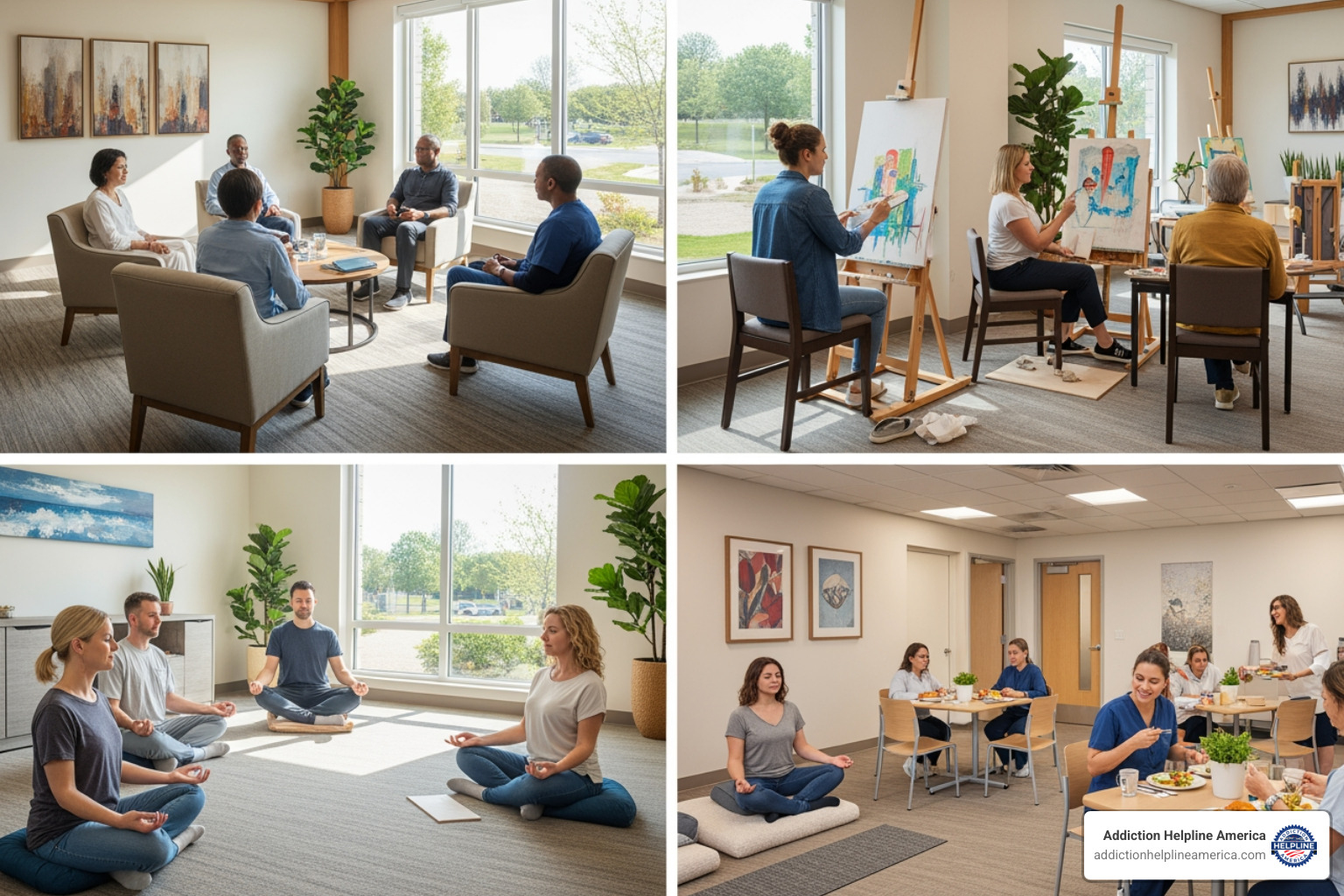
When Severe Anxiety Demands More Than Outpatient Care
Inpatient anxiety treatment provides 24/7 medical and psychiatric care in a structured facility for individuals whose anxiety has become so severe that outpatient therapy is no longer sufficient. While anxiety disorders affect 40 million adults in the U.S., many struggle to find effective help. When anxiety makes daily functioning impossible, inpatient care offers a protected environment to focus entirely on recovery.
This intensive level of care is designed for people experiencing:
- Severe symptoms that disrupt work, school, or self-care
- Safety concerns, including thoughts of self-harm or suicidal ideation
- Treatment resistance where outpatient methods haven’t helped
- Co-occurring conditions like substance use disorders or severe depression
- Crisis situations requiring immediate stabilization
A typical stay for crisis stabilization ranges from 3 to 7 days, while residential programs may last several weeks. Treatment includes comprehensive evaluation, evidence-based therapies like CBT and DBT, medication management, and 24/7 professional support.
At Addiction Helpline America, we guide individuals and families toward appropriate mental health and addiction treatment, including specialized inpatient anxiety programs. Our confidential helpline connects you with the resources you need to take the first step toward recovery.

Find more about Inpatient anxiety treatment:
Understanding Inpatient Anxiety Treatment: A Path to Stability
When anxiety makes daily life feel impossible, you may need more support than weekly therapy can provide. Inpatient anxiety treatment is designed for these moments, offering round-the-clock support to help you find stability.
The primary difference between inpatient care and other options is its immersive, 24/7 nature. Unlike outpatient therapy or partial hospitalization programs (PHP), inpatient treatment means you live at the facility. You are surrounded by medical and psychiatric professionals who provide continuous supervision, ensuring your safety and support at all times.
Call Now – Your Journey to Recovery Begins Today!

Take the first step towards a healthier life! Call now to connect with our compassionate team and start your recovery journey today. Your path to healing awaits!
Our recovery specialists are available 24/7 to provide support, and all calls are confidential and free. Reach out anytime – we’re here to help!
This environment removes you from the daily stressors and triggers that fuel anxiety, allowing you to focus entirely on healing. It’s an opportunity to hit the reset button during a crisis, stabilize, and learn new coping skills in a structured, safe space.
| Feature | Inpatient Treatment | Partial Hospitalization Program (PHP) | Outpatient Care |
|---|---|---|---|
| Environment | 24/7 residential facility | Structured daily program, return home at night | Appointments with therapists/doctors, live at home |
| Supervision | Continuous medical and psychiatric supervision | Daily clinical supervision | Intermittent supervision during appointments |
| Intensity | Most intensive, highly structured | Intensive, but allows for home reintegration | Least intensive, flexible schedule |
| Crisis Stabilization | Primary focus for severe symptoms/safety risks | Can serve as step-down or alternative to inpatient | Not suitable for acute crisis or safety risks |
| Removal from Triggers | Complete removal from daily stressors/triggers | Partial removal during program hours | Limited removal, managing triggers in daily life |
| Typical Length | Few days (crisis) to several weeks/months | Weeks to a few months | Ongoing, as needed |
| Therapies | Individual, group, family, medication management | Individual, group, medication management | Individual, group, medication management |
Through intensive, evidence-based therapies, you will develop improved coping mechanisms and practical strategies for long-term symptom management. While inpatient treatment doesn’t “cure” anxiety—a lifelong condition for most—it equips you with the knowledge and skills to live a more manageable life. The goal is to provide comprehensive support that helps you reclaim your life from anxiety.
Key Signs You May Need Inpatient Care for Anxiety
Recognizing when anxiety has become a crisis isn’t always easy. Many people struggle with severe symptoms before realizing they need intensive help. If you’re wondering if it’s time for a higher level of care, here are some key signs.

The clearest sign is when severe anxiety dismantles your daily life. This means you are consistently unable to attend work or school, or you find yourself neglecting personal hygiene and nutrition. When basic self-care feels impossible—like skipping meals or showers because of overwhelming anxiety—it’s a red flag that you need more support.
Another critical indicator is when outpatient treatment is no longer effective. If you’ve been attending therapy and taking medication but your symptoms continue to worsen, it doesn’t mean you’ve failed; it means you need a more intensive approach. Patients with anxiety disorders are six times more likely than others to be hospitalized for psychiatric issues, so there is no shame in needing this level of care.
Co-occurring substance use also signals a need for integrated treatment, as self-medicating with drugs or alcohol often worsens anxiety in a dangerous cycle.
The most urgent sign is any risk of self-harm or suicidal thoughts. If you are having thoughts of hurting yourself, this is a medical emergency requiring immediate, safe intervention. Inpatient anxiety treatment provides the necessary safety and support. For more information, see our guide on signs and symptoms of a crisis.
An emotional breakdown, where you feel you are completely falling apart, is another reason to seek intensive care. Learn more about emotional breakdown treatment and how it can help you stabilize.
Seeking inpatient anxiety treatment is a brave step toward healing. It’s recognizing you deserve more support and taking time to focus entirely on recovery.
What to Expect During an Inpatient Stay for Anxiety
Deciding to enter inpatient anxiety treatment can be intimidating, but knowing what to expect can ease your worries. The process is designed to help you heal in a safe, structured environment.
Upon arrival, you’ll undergo a comprehensive medical and psychological assessment. This evaluation allows the clinical team to create a personalized treatment plan custom to your specific needs, including your anxiety severity, co-occurring conditions, and medication history.
The length of stay varies. For crisis stabilization, a stay is typically short, around three to seven days. For those needing more time to build coping skills, residential programs can last for several weeks or months. Your team will work with you to determine the appropriate timeline.
Inpatient anxiety treatment follows a structured daily routine to create a sense of safety and predictability. Your days will be filled with a blend of therapeutic activities:

- Individual Therapy: One-on-one sessions to explore personal triggers and develop coping strategies.
- Group Therapy: Sessions with peers, often using modalities like Dialectical Behavior Therapy (DBT) to build skills in emotional regulation and distress tolerance.
- Educational Workshops: Classes on topics like stress management, trauma, and the science behind anxiety.
- Holistic and Recreational Therapies: Activities such as yoga, art, music, or outdoor time that support healing in non-traditional ways.
- Medication Management: Regular check-ins with medical staff to manage and adjust medications as needed.
Family involvement is often encouraged through therapy sessions and educational workshops. Research shows that family support can make treatment more effective by preparing your loved ones to help you after you return home.
Throughout your stay, you have 24/7 access to medical and psychiatric professionals. This constant supervision ensures you are never alone with your anxiety and have immediate support whenever you need it, creating a strong foundation for lasting change.
Call Now – Your Journey to Recovery Begins Today!

Take the first step towards a healthier life! Call now to connect with our compassionate team and start your recovery journey today. Your path to healing awaits!
Our recovery specialists are available 24/7 to provide support, and all calls are confidential and free. Reach out anytime – we’re here to help!
Core Components of Effective Inpatient Anxiety Treatment Programs
Effective inpatient anxiety treatment is built on evidence-based therapies, holistic care, and personalized plans. These pillars work together to help people regain control from anxiety.

Therapeutic Modalities and Approaches
Programs use a toolkit of proven psychotherapies to treat anxiety.
- Cognitive Behavioral Therapy (CBT) is a cornerstone of treatment. It helps you identify, challenge, and reframe the negative thought patterns that fuel anxiety.
- Dialectical Behavior Therapy (DBT) is especially useful for overwhelming emotions. It teaches practical skills in mindfulness, distress tolerance, emotion regulation, and interpersonal effectiveness.
- Exposure and Response Prevention (ERP) is the gold-standard treatment for Obsessive-Compulsive Disorder (OCD). It involves gradually facing feared situations while resisting compulsive behaviors to break the OCD cycle.
- Group therapy provides powerful peer support, creating a sense of connection and shared understanding.
- Experiential therapies (art, music, adventure) and mindfulness techniques are often integrated to help process emotions and anchor you in the present moment.
The Role of Medication in Inpatient Anxiety Treatment
Medication, managed by a psychiatrist, often plays a key role in stabilizing severe anxiety. Common medications include Selective Serotonin Reuptake Inhibitors (SSRIs) for long-term management and faster-acting Benzodiazepines for short-term, acute crisis relief.
Medication is most effective when combined with psychotherapy. It can reduce symptoms enough to allow you to fully engage in therapy, where you learn long-term coping skills. Medication can also help restore healthy sleep patterns, which are often disrupted by anxiety and are vital for recovery. Research shows a strong link between sleep disturbances and anxiety disorders.
Addressing Co-Occurring Disorders
It’s common for anxiety to coexist with other conditions like depression, substance use disorders, or eating disorders. This is called a dual diagnosis. The most effective programs offer integrated treatment that addresses all conditions simultaneously. This holistic approach treats the whole person, leading to more sustainable recovery. For those with substance use disorders, a hospital setting provides a safe, medically supervised environment for detoxification. Learn more about detox in a hospital setting.
Specialized Programs for Specific Needs
Because anxiety affects everyone differently, many centers offer specialized tracks:
- Disorder-Specific: Programs for OCD using ERP or for PTSD with trauma-informed care.
- Population-Specific: Programs custom for adolescents (13-17), young adults (18-26), women, veterans and first responders, LGBTQ+ clients, older adults (55+), and individuals with autism. These programs address the unique challenges and cultural contexts of each group, ensuring care is relevant and affirming.
At Addiction Helpline America, we help you find a program that matches your specific needs, because the right fit is crucial for recovery.
Life After Inpatient Treatment: Continuing Your Journey to Wellness
Completing inpatient anxiety treatment is a major accomplishment, but recovery is an ongoing journey. A smooth transition back to daily life requires careful planning and continued support to maintain your progress.
Before you leave, your team will create a comprehensive discharge and aftercare plan. This roadmap outlines the next steps in your recovery, often involving “step-down” levels of care that provide structured support as you reintegrate into your community.
- Partial Hospitalization Programs (PHP): Offer intensive daily programming while you live at home, bridging the gap between inpatient and outpatient care.
- Intensive Outpatient Programs (IOP): Involve several hours of therapy a few days a week, allowing you to manage work or school.
- Outpatient Therapy: Regular individual or group sessions provide ongoing support for long-term management.
Building a strong support system with family, friends, and peer support groups is also vital for continued success. Many facilities offer resources to help your loved ones support you effectively.
How to Find the Best Inpatient Anxiety Treatment Center
Choosing the right inpatient anxiety treatment center is a critical decision. Here are key factors to consider:
- Accreditations and Licensing: Look for state licensing and national accreditations (e.g., The Joint Commission) to ensure the facility meets high standards for quality and safety.
- Staff Qualifications: The team should include board-certified psychiatrists, licensed therapists, and experienced nurses.
- Treatment Philosophy: Ensure the center uses evidence-based therapies (CBT, DBT) and offers personalized treatment plans.
- Specialized Programs: If you have specific needs (e.g., OCD, PTSD, co-occurring disorders), find a center with expertise in those areas.
- Insurance Verification: Always verify your insurance coverage with the admissions team beforehand to understand costs and avoid financial stress. We can help you steer this process, just as we help individuals find the best detox facilities near you that accept their insurance.
At Addiction Helpline America, we offer free, confidential guidance to help you find a reputable center that aligns with your needs and insurance. You don’t have to do this alone.
Frequently Asked Questions about Inpatient Anxiety Treatment
It’s natural to have questions when considering inpatient anxiety treatment. Here are answers to some of the most common ones.
How long does inpatient anxiety treatment usually last?
The length of stay is personalized. For acute crisis stabilization, a stay is often brief, typically three to seven days. For more in-depth therapeutic work and skill-building, residential programs can last for several weeks or months. Your clinical team will assess your needs and progress to recommend the appropriate duration for your recovery.
Will my insurance cover inpatient treatment for anxiety?
Most insurance plans provide some level of coverage for mental health services, including inpatient anxiety treatment, due to mental health parity laws. However, coverage varies greatly. It is essential to verify your specific benefits, deductibles, and co-pays with the treatment center’s admissions team before you commit. They can help you understand your policy and any out-of-pocket costs. Addiction Helpline America can also help connect you with centers that work with your insurance.
Can I be treated for anxiety and a substance use disorder at the same time?
Yes, and this is the recommended approach. When anxiety and a substance use disorder occur together (a dual diagnosis), they often fuel each other. Reputable inpatient anxiety treatment centers offer integrated programs that address both conditions simultaneously. This comprehensive approach is the gold standard for care, as it treats the whole person and provides the best chance for lasting recovery from both disorders.
Call Now – Your Journey to Recovery Begins Today!

Take the first step towards a healthier life! Call now to connect with our compassionate team and start your recovery journey today. Your path to healing awaits!
Our recovery specialists are available 24/7 to provide support, and all calls are confidential and free. Reach out anytime – we’re here to help!
Conclusion: Find the Right Path to a Calmer Future
Living with severe anxiety can feel isolating, but you are not alone, and a calmer future is possible. Inpatient anxiety treatment offers a safe, structured path to recovery when outpatient care is not enough.
This intensive level of care provides 24/7 support to help you stabilize during a crisis, learn vital coping skills, and build a foundation for long-term wellness. As we’ve explored, effective programs use evidence-based therapies like CBT and DBT, medication management, and integrated care for co-occurring disorders.
An estimated 31.1% of U.S. adults experience an anxiety disorder at some point. If your anxiety prevents you from functioning, caring for yourself, or causes thoughts of self-harm, it’s a sign that you need a higher level of support.
At Addiction Helpline America, we are dedicated to helping you find the right path forward. We provide free, confidential, and personalized guidance to connect you with reputable inpatient anxiety treatment centers nationwide. We can answer your questions, help verify insurance, and find a program that fits your unique needs.
Recovery is possible. Reach out to us today to explore different types of treatment programs and take the courageous first step toward a more peaceful future. You don’t have to face this alone.
Our helpline is 100%
free & confidential
If you or someone you care about is struggling with drug or alcohol addiction, we can help you explore your recovery options. Don’t face this challenge alone—seek support from us.
Programs
Resources
Will my insurance
cover addiction
treatment?
We're ready to help
Find the best
drug or alcohol treatment
center
Are you or a loved one struggling with addiction? Call today to speak to a treatment expert.















